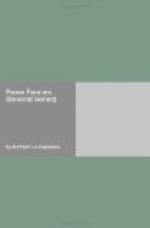THE FALLACY OF A NATION
It is, I am given to understand, a familiar axiom of mathematics that no number of ciphers placed in front of significant units, or tens or hundreds of units, adds in the smallest degree to the numerical value of those units. The figure one becomes of no more importance however many noughts are marshalled in front of it—though, indeed, in the mathematics of human nature this is not so. Is not a man or woman considered great in proportion to the number of ciphers that walk in front of him, from a humble brace of domestics to guards of honour and imperial armies?
A parallel profound truth of mathematics is that a nought, however many times it be multiplied, remains nought; but again we find the reverse obtain in the mathematics of human nature. One might have supposed that the result of one nobody multiplied even fifty million times would still be nobody. However, such is far from being the case. Fifty million nobodies make—a nation. Of course, there is no need for so many. I am reckoning as a British subject, and speak of fifty million merely as an illustration of the general fact that it is the multiplication of nobodies that makes a nation. ‘Increase and multiply’ was, it will be remembered, the recipe for the Jewish nation.
Nobodies of the same colour, tongue, and prejudices have but to congregate together in a crowd sufficiently big for other similar crowds to recognise them, and then they are given a name of their own, and become recognised as a nation—one of the ‘Great Powers.’
Beyond those differences in colour, tongue, and prejudices there is really no difference between the component units—or rather ciphers—of all these several national crowds. You have seen a procession of various trades-unions filing toward Hyde Park, each section with its particular banner with a strange device: ‘The United Guild of Paperhangers,’ ’The Ancient Order of Plumbers,’ and so on. And you may have marvelled to notice how alike the members of the various carefully differentiated companies were. So to say, they each and all might have been plumbers; and you couldn’t help feeling that it wouldn’t have mattered much if some of the paper-hangers had by mistake got walking amongst the plumbers, or vice versa.
So the great trades-unions of the world file past, one with the odd word ‘Russia’ on its banner; another boasting itself ’Germany’—this with a particularly bumptious and self-important young man walking backward in front of it, in the manner of a Salvation Army captain, and imperiously waving an iron wand; still another ‘nation’ calling itself ‘France’; and yet another boasting the biggest brass band, and called ‘England.’ Other smaller bodies of nobodies, that is, smaller nations, file past with humbler tread—though there is really no need for their doing so. For, as we have said, they are in every particular like to those haughtier nations who take precedence of them. In fact, one or two of them, such as Norway and Denmark—were a truer system of human mathematics to obtain—are really of more importance than the so-called greater nations, in that among their nobodies they include a larger percentage of intellectual somebodies.




